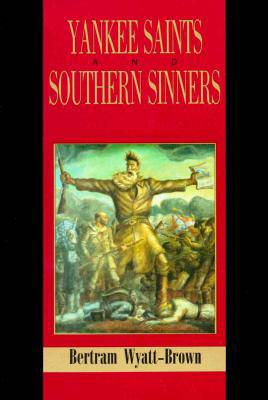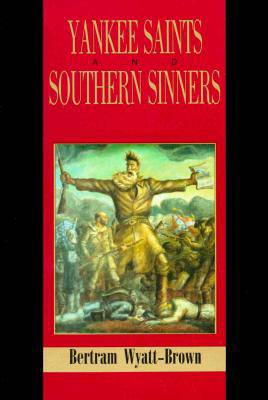
En raison d'une grêve chez bpost, votre commande pourrait être retardée. Vous avez besoin d’un livre rapidement ? Nos magasins vous accueillent à bras ouverts !
- Retrait gratuit dans votre magasin Club
- 7.000.000 titres dans notre catalogue
- Payer en toute sécurité
- Toujours un magasin près de chez vous
En raison de la grêve chez bpost, votre commande pourrait être retardée. Vous avez besoin d’un livre rapidement ? Nos magasins vous accueillent à bras ouverts !
- Retrait gratuit dans votre magasin Club
- 7.000.0000 titres dans notre catalogue
- Payer en toute sécurité
- Toujours un magasin près de chez vous
Description
Many scholars, according to Bertram Wyatt-Brown, have mistakenly attributed the coming of the Civil War solely to the slaveholding South's determination to retain black bondage as a means of economic and political advantage. That view, he maintains, too readily diminishes the ethical dynamics involved in the chasm between antebellum North and South. In Yankee Saints and Southern Sinners, Wyatt-Brown explores in a series of wide-ranging essays the ethical differences--epically with regard to honor, liberty, and slavery--that divided the two regions of the country.
Slavery was, of course, the crucial issue in the conflict, but such moral concerns as honor and shame, conscience and guilt were inextricably a part of the dispute as well. Northerners, under abolitionist and antislavery guidance, came to regard slavery as a violation of American conscience and understandings of individuality, personal liberty and civic responsibility, whereas soothers adhered to an ethical scheme based on traditional concepts of honor. Wyatt-Brown suggests that to most southern whites the rubric of honor was much more than a matter of duels and political posturing. It was instead an integral part of the moral and cultural heritage of the region, affecting a variety of social relationships. Sometimes the dictates of honor were even more powerful than the Christian morality that nearly all Americans espoused. Using Stanley Elkins' antislavery interpretation as a point of departure, Wyatt-Brown devotes the first part of the book to the abolitionists' dynamic relationship to evangelical culture in which conscience, implanted in childhood, became the primary ethical code guiding reformers. In the most dramatic and probing chapter in this section, he shows how the violent "antinomian" John Brown capitalized on the tensions between Christian conscience and primal manhood to gratify his own and his fellow countrymen's desire for righteous glory, albeit for noble ends. The second half of the book reveals the contrasting ethical spirit of the South, as explained in W.J. Cash's Mind of the South. After placing the proslavery argument in the context of evangelical and, later, secular "modernity," Wyatt-Brown analyzes the ethical texture of secessionism in one of the book's most original and intriguing arguments. Differences over the meaning and applicability of honor and shame, he contends, played a major part in the South's struggle in 1860 and 1861 over secession and the North's response to it. Making abundant use of anthropological, sociological, and psychological insights, Bertram Wyatt-Brown offers here an interpretation of the causes of the Civil war that is both provocative and persuasive.Spécifications
Parties prenantes
- Auteur(s) :
- Editeur:
Contenu
- Nombre de pages :
- 227
- Langue:
- Anglais
Caractéristiques
- EAN:
- 9780807116074
- Date de parution :
- 01-09-90
- Format:
- Livre broché
- Format numérique:
- Trade paperback (VS)
- Dimensions :
- 153 mm x 229 mm
- Poids :
- 331 g

Les avis
Nous publions uniquement les avis qui respectent les conditions requises. Consultez nos conditions pour les avis.






